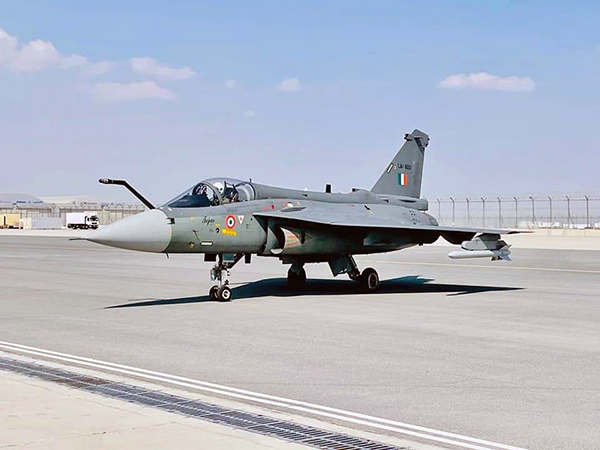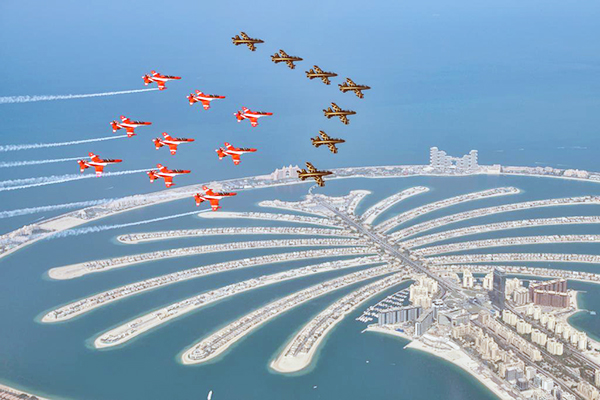LCA Getting Global Attention
India is keen to promote its indigenously developed and produced Tejas single-engine Light Combat Aircraft at overseas exhibitions, and the biennial Dubai Airshow, was no exception. The Dubai Air Show is one of the leading aerospace events in the Middle East and amongst the growing Air shows across the globe. The show was inaugurated by Dubai Crown Prince and Chairman of Dubai Seikh bin Mohammed bin Rashid Al Maktoum on November 14, and concluded on November 18.
The Tejas Light Combat Aircraft was prominent in the flying display at the Dubai Airshow this year, as manufacturer HAL eyes first deliveries of the Mk1A variant by early 2023, and work continues on the more advanced Mk2.
An Indian Air Force (IAF)-piloted Tejas Mk1 was a daily feature in the flying display and three aircraft were on static display. “The aircraft manoeuvred effortlessly, showing off its agility and versatility,” the IAF said adding that it is a testament to the rapid strides that the platform has achieved in recent times.
The first of 83 Tejas Mk1A aircraft on order for the IAF should be delivered in Q4 2022, or Q1 2023 at the latest.
Tejas Display
The Show commenced with a combined flypast carried out by the IAF’s Suryakiran Aerobatics Team along with the UAE’s Al Fursan Display Team. The IAF in a statement called it ‘a display that signified the deep camaraderie and bonhomie between the two Air Forces.’
Nine Hawk 132 of the Suryakiran Team flew in synchronisation with seven Aermacchi MB-339 of Al Fursan over significant landmarks in Dubai including the Burj Khalifa, Palm Jumeirah, and Burj Al Arab.
The indigenously manufactured Tejas reinforced its ever-increasing popularity by an awe-struck demonstration flight exhibiting its “versatility” and “agility”.
Global Attention
So far Malaysia, Argentina, and Egypt have expressed their interest in the IAF’s Tejas. The Royal Malaysian Air Force (RMAF) has plans to purchase 18 multirole light fighter jets. It also has set an added option to buy another 18 later. The bid is being considered significant for it may emerge as the first global buyer of the India-made Tejas.
According to Malaysian media reports, six bids have been filed for RMAF light combat aircraft (LCA) tender. The MiG-35 from Russia, the L-15 from China, the FA-50 from Korea Aerospace Industries (KAI), the Hurjet from Turkey Aerospace Industries (TAI), and the Leonardo M-346 from Italy are among the bidders. The Pakistani-Chinese JF-17 Thunder, which was initially thought to be among the competitors, was not on the list. The Yakovlev Yak-130 and the Boeing T-7A Red Hawk were also missing.
According to HAL chief, R Madhavan, HAL met practically all of the RMAF’s conditions. “We can easily engineer one or two of the Malaysian parameters that we don’t meet. For example, we can rapidly add the onboard oxygen generating system (OBOGS) that they requested,” R Madhavan, HAL chief said.
According to Madhavan, many of the other competitors do not match Malaysian requirements. The Chinese-Pakistani JF-17 lacks the required active electronically scanned array (AESA) radar, and its mid-air refuelling capability is currently being evaluated.
Buenos Aires is looking for 12 light fighters. The matter is being pursued by HAL, but there is a UK embargo on the export of British defence equipment to Argentina that dates back to the Falklands War. Several systems and subsystems of the Tejas, which are made in the United Kingdom by companies including BAE Systems, Cobham, and Martin-Baker will need to be replaced by HAL to make the fighter jet eligible for export. Previously, the UK blocked the sale of South Korean fighter jets to Argentina.
Egypt had been rumoured to be interested in the Tejas since the Bahrain Air Show 2018. The Egyptian Air Force is considering replacing its aging Dassault/Dornier Alpha aircraft
Another reason for the Tejas’ appearance at the Dubai Air Show was to gauge interest in the region. However, weaning Cairo off US platforms, which Washington has long provided at subsidized rates, will be a big challenge.
HAL claimed that it has proposed Tejas as a Lead-In Flight Trainer to the Royal Australian Air Force (RAAF). According to HAL’s annual report, the Royal Australian Air Force (RAAF) issued a Request for Information (RFI) for a trainer aircraft in July of last year, to which HAL has already responded.
Sri Lanka has a small air force with only a few aircraft. During the civil war, these fighters were primarily responsible for bombing insurgents. Sri Lanka has already turned down Pakistan’s offer of the JF 17 Thunder and is believed to have shown interest in the Indian Tejas.
Tejas Mk 2 Under Development
The Tejas Mark 2 is being designed and developed to replace multiple strike fighters of IAF viz, SEPECAT Jaguar, Dassault Mirage 2000 and Mikoyan MiG-29.
The development process of a more advanced Mk2 version of the Indian fighter is making ateady progress. The preliminary design studies for the Tejas Mark 2 was completed in 2014 and was in detailed design phase as of 2015. The redesigned fighter was first unveiled at the Aero India Show 2019. It was a 17.5 tonne class fighter with close coupled canards and integrated IRST system. Metal-cutting for the Tejas Mark 2 started in February 2021. The ‘roll out’ of the first prototype is scheduled for December 2022 with its first flight expected to be in 2023. A total of four prototypes are being planned initially. Designers plan to complete the Tejas Mk2 by 2026.
The Tejas Mk2 will feature a new Uttam AESA radar (which could also be installed on the latest and upcoming production batches of the Tejas Mk1A) and a General Electric F414 INS6 engine to deliver better performance than the F404 IN20 used on the Tejas Mk1A.
Other planned improvements in the Tejas Mk2 include stealth measures to reduce the radar cross-section of the aircraft, a radiation-absorbent coating, as well as a new integrated EW system.













